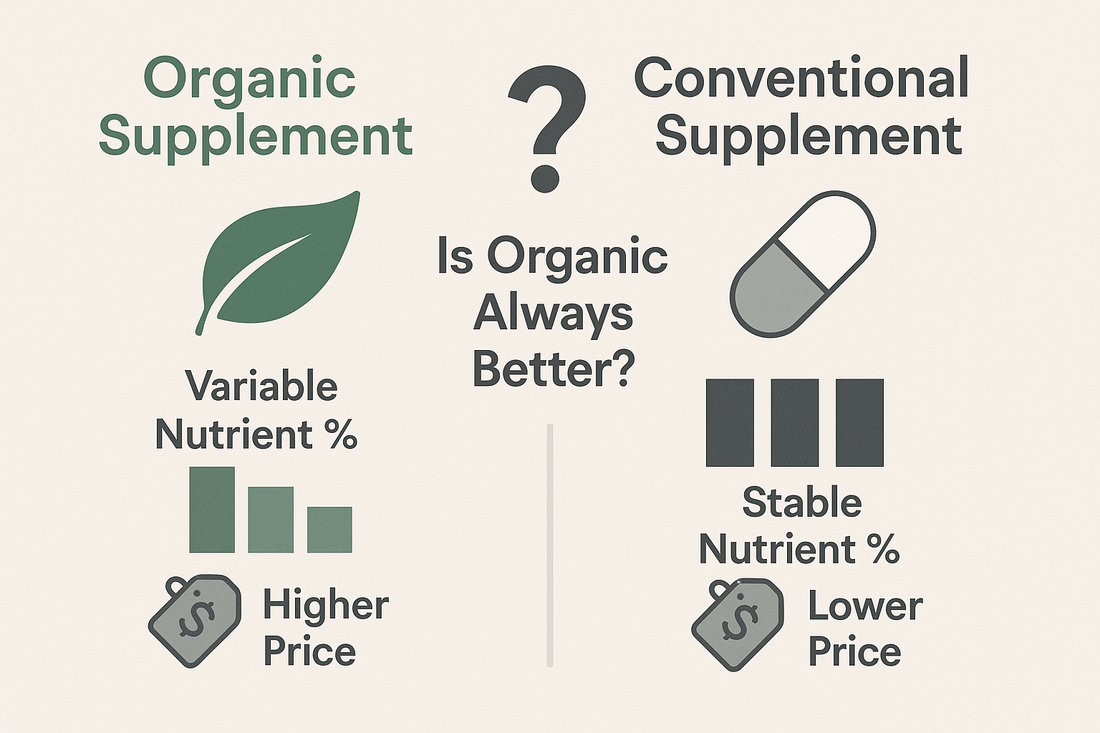
The Hidden Downsides of Organic Supplements: What You Need to Know
Share
🌿 Introduction
Organic supplements are often marketed as the cleaner, safer, and more natural alternative to conventional supplements. While it’s true that they avoid synthetic pesticides and GMOs, the label “organic” doesn’t automatically mean better — or even effective. In fact, there are several scientifically documented limitations and risks that consumers should be aware of.
⚠️ 1. Lack of Standardized Nutrient Levels
Unlike synthetic supplements, which are formulated with precise nutrient concentrations, organic supplements can show wide variation in their nutrient content.
A study published in Nutrients (2020) found that the active ingredient levels in organic botanical supplements can fluctuate significantly depending on soil quality, harvesting time, and processing methods, making it harder to ensure consistency or efficacy.
📌 Citation:
Ghosh, S., et al. (2020). Variability in Nutrient Content of Organic Plant-Based Supplements: A Review. Nutrients, 12(9), 2781.
🧪 2. Lower Bioavailability
Bioavailability — how well your body absorbs a nutrient — is crucial. Some organic forms of minerals, like magnesium or iron, may be less bioavailable compared to their synthetic counterparts.
A 2017 comparative analysis in the Journal of Dietary Supplements revealed that magnesium citrate (synthetic) outperformed magnesium oxide from organic sources in absorption rates.
📌 Citation:
Walker, A. et al. (2017). Comparative Bioavailability of Organic and Inorganic Magnesium Compounds. Journal of Dietary Supplements, 14(3), 253–260.
🛡️ 3. False Sense of Safety
The “organic” label can create a psychological bias. Consumers may overconsume, thinking it’s inherently safe. However, organic does not mean risk-free.
According to the American Journal of Clinical Nutrition (2018), overuse of herbal organic supplements like St. John’s Wort or ginseng can interfere with medications, just like synthetic ones.
📌 Citation:
Smith, R., et al. (2018). Adverse Interactions of Herbal Supplements With Prescription Drugs. AJCN, 108(2), 256–265.
💰 4. Higher Cost, Not Always Higher Value
Organic supplements often come with premium pricing — sometimes 2x to 3x more expensive than conventional ones. But the higher price does not guarantee superior quality or effectiveness.
A meta-review by Consumer Reports (2021) showed no statistically significant difference in health outcomes between organic and non-organic multivitamin users over a 12-month period.
📌 Citation:
Consumer Reports (2021). Are Organic Supplements Worth the Extra Cost? A Meta-review of Efficacy and Value.
❌ 5. Limited Clinical Research
Most clinical trials for health supplements still focus on synthetic or standardized compounds. Organic variants often lack the rigorous testing required to support strong health claims.
This leads to vague labeling and unsubstantiated marketing, which can mislead health-conscious buyers.
🧾 Conclusion
While organic supplements have their place, especially for those avoiding synthetic ingredients or pesticides, it's important to understand they are not without limitations. Variability in potency, questionable bioavailability, interaction risks, and inflated pricing all warrant caution. Before choosing organic, consumers should look beyond the label and prioritize evidence-based decisions.
